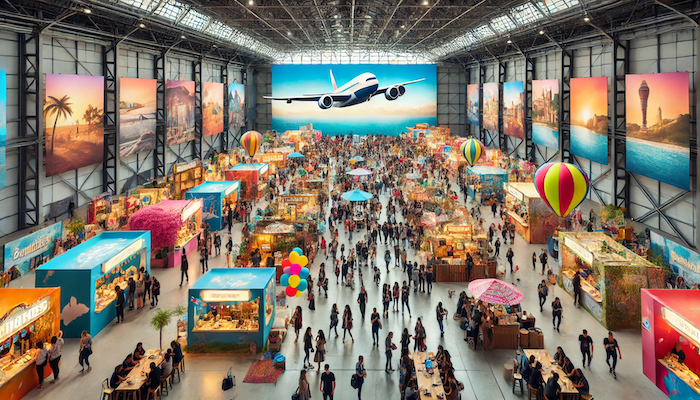
Upselling is a pivotal strategy for tours, attractions, and activity operators to enhance customer experiences while maximizing revenue.
In this post, we will explain how AI upselling in tourism can take your business to the next level.
- What is upselling?
- How can AI make upselling better and easier?
- What are the benefits of AI upselling?
- Elements of AI-powered upselling
- Upselling tactics for tours and attractions
- Challenges and limitations of AI upselling
What is upselling?
Upselling is a sales strategy in which businesses encourage customers to make additional purchases by opting for higher-value products or adding complementary items to their original choice. It’s a valuable strategy used by tours, attractions, and activity operators to maximize revenue.
How can AI make upselling better and easier?
The idea behind an upsell is to offer customers relevant add-ons or upgrades to enhance their overall experience. AI revolutionizes upselling by automating and personalizing the process.
For marketing directors overseeing various tours—be it distillery tours, TV studio tours, adventure travel tours, or boat tours—AI algorithms can analyze customer data to predict what customers are most likely interested in. Then, recommend them at the right time, increasing the likelihood that your customers will say yes to the upsell.
For example, a distillery tour marketing director might leverage AI to recommend premium tasting experiences based on a visitor’s past visits.
What are the benefits of AI upselling?
Using AI in strategic ways to assist with upselling can significantly boost revenue and profit, improve guest experience, and help you manage your resources efficiently.
- Boosting revenue and profit – You can analyze customer behavior and preferences to suggest additional services or upgrades. For a tour operator, this could mean offering premium packages, add-on experiences, or exclusive amenities based on the customer’s interests. For example, suppose you’re a marketing director for a studio tour. In that case, you might use AI to analyze viewer preferences and suggest exclusive behind-the-scenes packages relevant to that particular user. Again, this highly personalized, targeted approach increases the likelihood of customers making additional purchases, thereby boosting revenue and profit.
- Improving guest experience – When each guest’s preferences and previous interactions are considered, the offers they receive are bound to appeal to them. For instance, a boat tour operator might suggest an add-on champagne bottle to couples booking a sunset tour. Given the romantic nature of the tour, there’s a good chance the couple is celebrating a milestone. By offering them an upsell that will make the experience more special, the tour itself will become more memorable.
- Efficient guide and inventory management – Suppose specific tours or attractions are consistently popular. In that case, AI can help schedule tour guides and manage inventory accordingly, e.g., ensuring enough champagne bottles to meet demand in the scenario above. This ensures that resources are allocated efficiently, preventing overbooking, underutilization, or other mishaps. This streamlines operations and contributes to a smoother and more organized guest experience.
Elements of AI-powered upselling
Let’s explore the main elements of AI-powered upselling, ranging from predictive analytics to chatbots.
Predictive analysis
Predictive analytics uses advanced analysis techniques — such as data mining and modeling, machine learning, and AI — to predict future outcomes.
As a tour operator, you can use historical data and machine learning to forecast future customer behavior, like booking volume in your low and peak seasons. You would also use a predictive analysis tool to identify patterns in guest data — think customer feedback or social media mentions — to help predict their behavior.
We can see a great example of this at Point Defiance Zoo & Aquarium in Tacoma, Washington, which began using predictive analytics to estimate attendance based on the weather forecast and historical visitor data. On one of their July 4th events, the zoo predicted that 100 people would visit. This meant that for the first time, the zoo was confident enough to cut the allocation for part-time staff and build its budget accordingly.
Real-time data and data analysis
Real-time data and analysis are pivotal in providing instantaneous and relevant recommendations.
For a boat tour marketing director, for instance, this can translate into a dynamic and personalized booking process. When a customer is booking a boat tour, AI systems can swiftly analyze the current weather conditions; the system might then suggest enticing add-ons such as exclusive whale-watching experiences. If the weather is favorable for such an activity, the AI can instantly recognize this opportunity and present it as an appealing option to the customer.
This enhances the customer’s booking journey and showcases a responsiveness that aligns with their immediate needs and desires.
The boat tour operator benefits by maximizing the potential for additional revenue through well-timed and contextually relevant upsell suggestions. The real-time nature of this approach ensures that customers receive recommendations tailored to the specific conditions and moments of their booking experience, creating a more engaging and satisfying interaction.
Machine learning models
Machine learning models constantly adapt and improve, refining upselling strategies over time.
Let’s say you own or work for a distillery tour; this means the system becomes more adept at recommending unique tasting events tailored to individual preferences. Machine learning models excel in discerning patterns and trends within large datasets, allowing them to comprehend the intricate nuances of customer behavior.
In the context of a distillery tour, these models can analyze past customer interactions, including preferences for specific types of spirits, tour durations, or even preferred tasting experiences. If a customer has previously shown a preference for whiskey tastings during their distillery tours, a machine learning model can recognize this pattern. So when the same customer contemplates another tour, the system can intelligently suggest premium whiskey-tasting experiences or related merchandise.
This level of personalization enriches the guest experience by offering precisely what aligns with their preferences and contributes to increased revenue for the distillery tour.
Chatbots
Chatbots provide an interactive upselling experience. During a live conversation with a potential guest, a chatbot can recommend additional tour add-ons or upgrades based on the customer’s preferences, past booking history, or browsing behavior. Unlike human agents, chatbots can operate around the clock, providing upselling opportunities at any time of the day or night.
In addition to upselling, chatbots can identify relevant cross-selling opportunities by suggesting related tours, activities, or services that complement the customer’s original booking.
For example, if a customer books a city tour, the chatbot can recommend additional experiences, such as guided museum visits or culinary tours in the same destination.
Upselling tactics for tours and attractions
Here are three effective upselling tactics used within the travel industry.
1. Bundle offers
Marketing directors can create bundled packages and offer discounts on combined services. For example, an adventure travel marketing director might offer a bundle that includes guided tours, equipment rental, and exclusive access to specific trails.
2. Personalized recommendations
We routinely discuss the evolving importance of personalization in travel. With AI, you can make personalized upsell suggestions based on individual preferences. You can email these suggestions to a guest after they book or even offer them right on the spot before they check out. In either case, the relevancy of your offers will determine whether your guests will want to spend the extra cash to upgrade their experience.
3. Limited-time promotions
Creating a sense of urgency through limited-time offers is a strategy used across several industries, especially travel. The truth is that our emotions — not logic — are the real drivers behind our purchasing decisions. This is why FOMO marketing, or “fear of missing out” marketing, can be so effective. AI algorithms can present guests with relevant limited-time upsell opportunities that are hard to skip.
Challenges and limitations of AI upselling
While AI upselling brings numerous benefits, operators and their marketing directors must navigate challenges.
Data privacy
It is crucial to maintain a balance between personalization and data privacy. Marketing directors must ensure customer data is used responsibly to avoid privacy concerns.
Fine-tuning Language Models (LLMs)
Ensuring that language models are finely tuned is vital. This means ensuring that the AI system understands and responds accurately to diverse customer queries, whether it’s about the weather, payments, or specific equipment requirements.
Handling diverse and complex questions
Customers may pose diverse and complex questions, and training your AI systems to understand and respond appropriately takes time and effort. Yet, this is the only way to ensure a positive customer experience across different tour categories.
Overcoming negative customer feedback
If your chatbot messes up — like it recommends a tour that no longer exists — you’ll answer for the mistake. Machine algorithms can often be trained to be more accurate than human agents, given their ability to quickly access and interpret data. But that doesn’t mean mistakes never happen. If they do, you may be dealing with negative customer feedback.
Ensuring relevant upsell offers
AI must consistently deliver relevant offers. In other words, your job is to ensure the upsell suggestions align with each tour’s unique characteristics. Ongoing monitoring and adjustments are necessary to maintain relevance in the ever-changing landscape of tours and attractions.
***
From increased revenue and improved guest experiences to streamlined inventory management and personalized recommendations, AI can help you better execute your upsell strategy.




